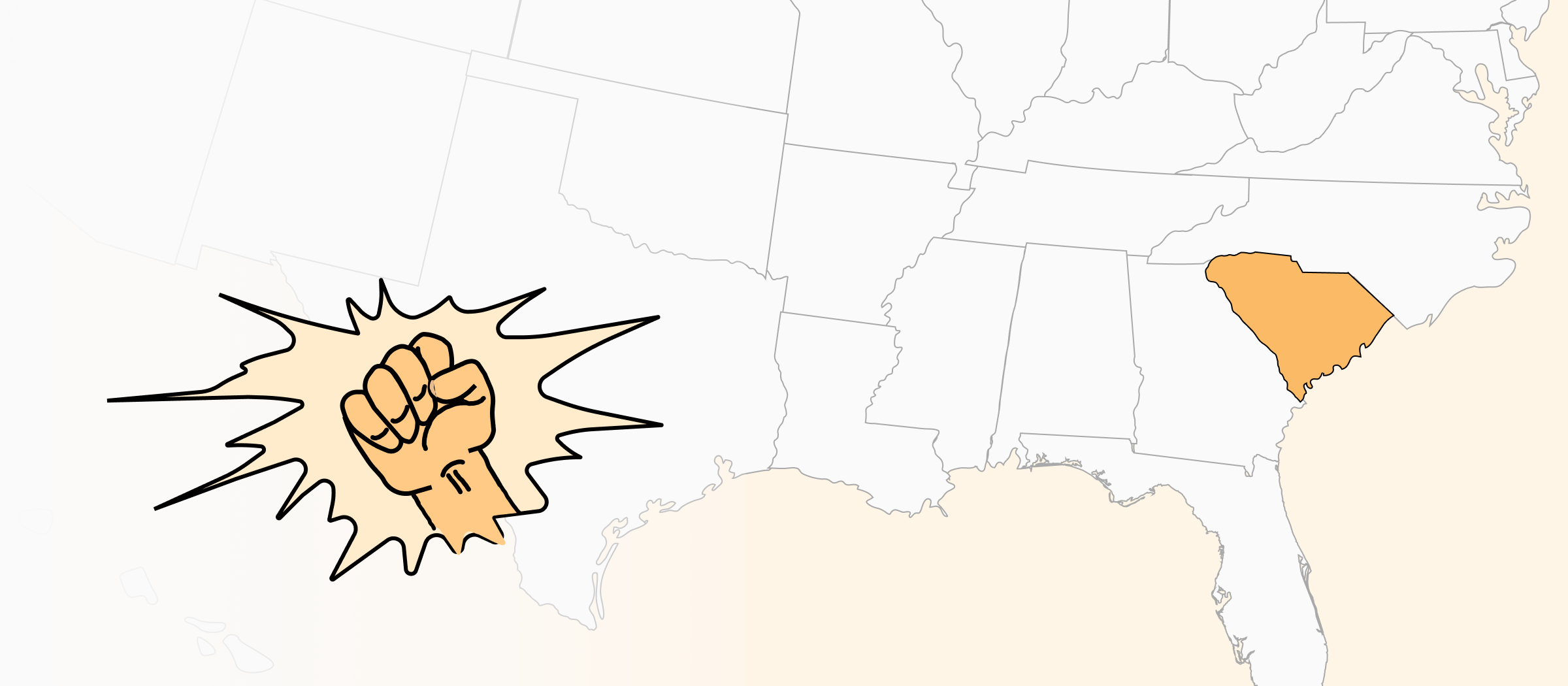| Tenant Protected Actions |
|
| Landlord Retaliatory Actions |
|
| Penalties for Retaliation |
|
When Is It Illegal for Landlords to Retaliate in South Carolina?
It’s illegal for South Carolina landlords to retaliate against tenants by raising rent past market value or filing eviction (including refusal to renew the lease) against tenants who have taken one of the following protected actions:
- Complaining to the government about health and safety issues on the rental property.
- Complaining to the landlord about violations of South Carolina’s Landlord-Tenant Act.
The law allows an exception when the landlord can prove a non-retaliatory, good-faith reason for the alleged retaliatory action. For example, a landlord can evict if a tenant refuses to repair damage that’s the tenant’s fault, even if the tenant has complained to the government about the issue.
What Can Tenants Do in Response in South Carolina?
South Carolina tenants can primarily respond to landlord retaliation by suing for quiet enjoyment of the property. This can be done affirmatively, or by notifying the landlord (within 10 days of being served an eviction notice) that retaliation will be raised as a defense.
If the tenant wins in a situation where the landlord refused to renew the lease, the tenant gets to stay in the property for an extra 75 days without increased rent past fair market value, or decreased services.
In any event, the tenant can recover attorney fees, plus monetary damages of three times the actual damages or three times the monthly rent (whichever is greater).
Sources
- 1 S.C. Code Ann. § 27-40-910(a) (2022)
-
“Except as provided in this section, a landlord shall not retaliate by increasing rent to an amount in excess of fair-market value or decreasing essential services or by bringing an action for possession after: (1) the tenant has complained to a governmental agency charged with responsibility for enforcement of a building or housing code of a violation applicable to the premises materially affecting health and safety; or (2) the tenant has complained to the landlord of a violation of this chapter.”
Source Link - 2 S.C. Code Ann. § 27-40-910(g) (2022)
-
“If the landlord retaliates against the tenant for engaging in conduct protected under section (a) by refusing to renew the lease, and if the tenant is not in default as to payment of rent, the landlord may not recover possession of the dwelling unit for seventy-five days and may not increase rent to an amount in excess of fair-market value or decrease essential services pending the recovery of the dwelling unit, provided that the tenant proves the landlord’s violation of this chapter, the landlord had notice of such violation, and the landlord had notice of the tenant’s complaint prior to expiration of the lease.”
Source Link - 3 S.C. Code Ann. § 27-40-910(b) (2022)
-
“If the landlord acts in violation of subsection (a), the tenant is entitled to the remedies provided in Section 27-40-660 as a defense in any retaliatory action against him for possession. If the defense by the tenant is without merit, the landlord is entitled to reasonable attorney’s fees. If the defense is raised in bad faith, the landlord may recover up to three month’s periodic rent or treble the actual damages, whichever is greater. If the landlord recovers damages under this section, he may not also recover damages under Section 27-40-760.”
Source Link - 4 S.C. Code Ann. § 27-40-910(e) (2022)
-
“Notwithstanding the provisions of subsection (a) a landlord who rents more than four adjoining dwelling units on the premises may increase rent without there being a presumption of retaliation, provided that the increase applies uniformly to all tenants, or so long as the rent does not exceed the fair-market value.”
Source Link - 5 S.C. Code Ann. § 27-40-910(c) (2022)
-
“Notwithstanding subsections (a) and (b), a landlord may bring an action for possession if: (1) the violation of the applicable building or housing code was caused primarily by lack of reasonable care by the tenant, a member of his family, or other person on the premises with his permission or who is allowed access to the premises by the tenant, or (2) there is material noncompliance by the tenant under Section 27-40-710 or Section 27-40-720; or (3) compliance with the applicable building or housing code requires alteration, remodeling, or demolition which would effectively deprive the tenant of use of the dwelling unit.”
Source Link - 6 S.C. Code Ann. § 27-40-910(f) (2022)
-
“In an action for possession where the tenant intends to raise a defense under this section, the tenant must notify the landlord in writing within ten days after service of the Rule to Vacate or Show Cause of his intent to do so. After the tenant has filed an Answer to the Rule, the court shall hear the matter as promptly as is feasible.”
Source Link - 7 S.C. Code Ann. § 27-40-910(h) (2022)
-
“Any landlord who acts in retaliation against the tenant for engaging in protected conduct is liable for damages up to three month’s rent or treble the actual damages sustained by the tenant, whichever is greater, and reasonable attorney’s fees. Nothing in this section may be construed to prohibit an action for damages after a landlord has recovered possession of the dwelling unit in subsection (c), provided the ejectment was primarily in retaliation against the tenant’s protected conduct.”
Source Link

